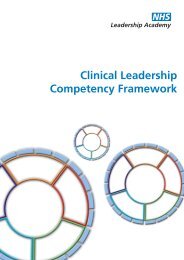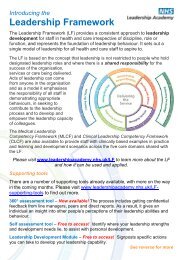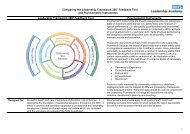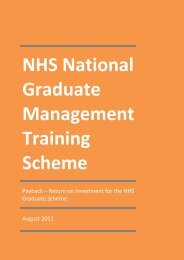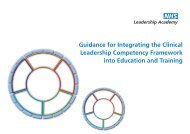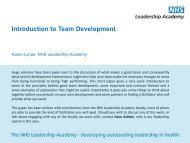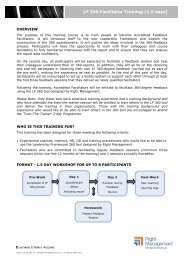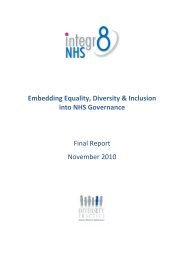Healthy NHS Board: a review of - NHS Leadership Academy
Healthy NHS Board: a review of - NHS Leadership Academy
Healthy NHS Board: a review of - NHS Leadership Academy
You also want an ePaper? Increase the reach of your titles
YUMPU automatically turns print PDFs into web optimized ePapers that Google loves.
7.5 Processes<br />
A <strong>review</strong> <strong>of</strong> the literature on board effectiveness<br />
concludes that, ‘board processes (the way information<br />
is gathered, knowledge is built and decisions are made)<br />
are more important than structure and composition’<br />
and cites evidence that high performing hospitals have<br />
boards that engage more strongly with governance<br />
processes such as formulating strategy and shaping a<br />
proactive and interactive culture (Chambers et al., 2013).<br />
In line with research described in our original <strong>review</strong>,<br />
recent guidance recommends that such matters as<br />
safety, quality, and ethics should be given priority in<br />
board agendas (Francis, 2013, Committee on Standards<br />
in Public Life, 2013, Institute <strong>of</strong> Chartered Secretaries and<br />
Administrators, 2011).<br />
As in our original <strong>review</strong>, the importance <strong>of</strong> balancing<br />
board processes is noted: a <strong>review</strong> <strong>of</strong> evidence on board<br />
performance describes the dangers <strong>of</strong> ‘managerial<br />
myopia’, where excessive focus on performance<br />
monitoring detracts from strategic thinking (Chambers et<br />
al., 2013).<br />
Corporate guidance notes the potential influence <strong>of</strong><br />
conflicts <strong>of</strong> interest, emotional attachments and reliance<br />
on incomplete information when making decisions. To<br />
mitigate these effects in the case <strong>of</strong> important decisions,<br />
a number <strong>of</strong> processes are recommended. These include<br />
providing a written description <strong>of</strong> how a proposal was<br />
developed, commissioning independent advice, and<br />
establishing a single purpose subcommittee (Financial<br />
Reporting Council, 2011).<br />
Research and commentary on board effectiveness<br />
notes the value <strong>of</strong> board evaluations and development<br />
programmes (Chambers et al., 2013, Deffenbaugh, 2012,<br />
Storey et al., 2010a). Corporate guidance recommends<br />
that evaluation should be tailored to the board and<br />
setting (Financial Reporting Council, 2011). However, no<br />
evidence was found on how board development tools,<br />
interventions and programmes influence organisational<br />
performance, and recommended that this should be<br />
researched further, with consideration given to the<br />
influences <strong>of</strong> external facilitation and organisational<br />
context (Chambers et al., 2013).<br />
In addition to formal evaluations, research on board<br />
engagement suggests there is value in boards reflecting<br />
on the effectiveness <strong>of</strong> their meetings, for example in<br />
terms <strong>of</strong> how the meeting has contributed to improving<br />
quality, learning and engagement (Alimo-Metcalfe,<br />
2012).<br />
To support the important relationship between the<br />
board <strong>of</strong> an <strong>NHS</strong> Foundation Trust and their Council<br />
<strong>of</strong> Governors, it is recommended that the board sends<br />
a copy <strong>of</strong> the board meeting agenda to the Council<br />
before the meeting takes place, and the minutes <strong>of</strong><br />
the meeting once they are complete (Monitor, 2012a,<br />
Monitor, 2012b).<br />
Recent survey and observational research suggests<br />
board activity may fall short <strong>of</strong> what is recommended in<br />
guidance. For example the proportion <strong>of</strong> strategic items<br />
and clinical and quality issues on agendas was found<br />
to be lower than recommended (Institute <strong>of</strong> Chartered<br />
Secretaries and Administrators, 2011), and almost 20%<br />
<strong>of</strong> boards surveyed did not dedicate over 20% <strong>of</strong> the<br />
meeting to quality and safety issues (Jha and Epstein,<br />
2013).<br />
7.6 People strategy<br />
As described in our original <strong>review</strong>, boards should<br />
attend to workforce issues in their strategy. Recent<br />
guidance suggests effective boards recognise their<br />
workforce as their greatest resource (Chartered<br />
Institute <strong>of</strong> Personnel and Development, 2012) and<br />
that ‘exploiting passion’ <strong>of</strong> staff may be beneficial<br />
(Francis, 2013). Guidance and research suggest that<br />
‘talent management’ - developing future leaders from<br />
within the organisation - is a central focus <strong>of</strong> successful<br />
boards (Chambers, 2012, Veronesi et al., 2012,<br />
Financial Reporting Council, 2011). For example, the<br />
potential value <strong>of</strong> doctors as executives identified in US<br />
research (Goodall, 2011) implies the need for a strategy<br />
that ensures sufficient development and training<br />
programmes are in place, and which incentivises clinical<br />
leadership (Financial Reporting Council, 2011, Veronesi<br />
et al., 2012).<br />
www.leadershipacademy.nhs.uk 33



